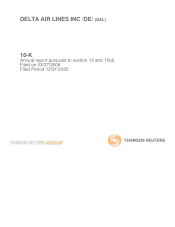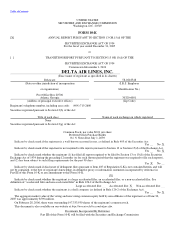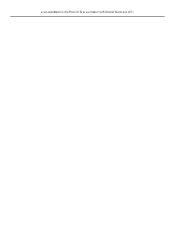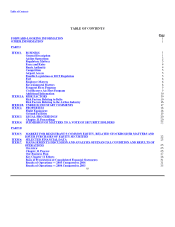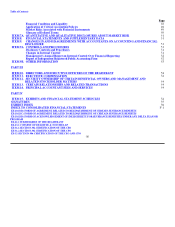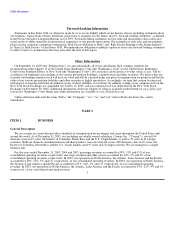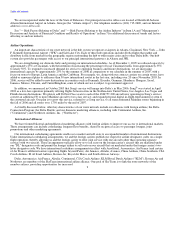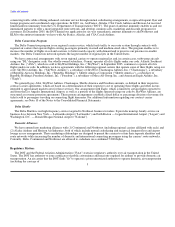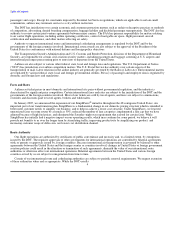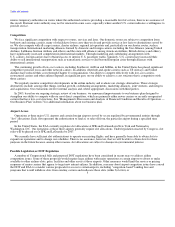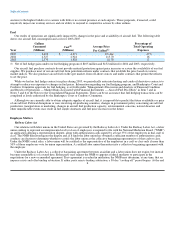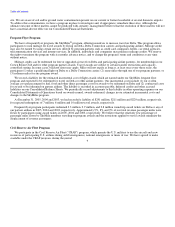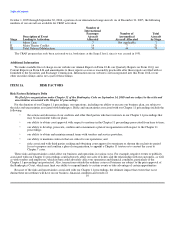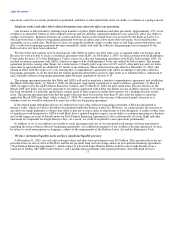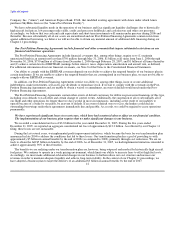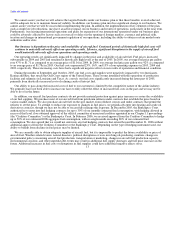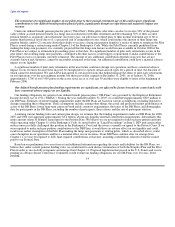Delta Airlines 2005 Annual Report Download - page 9
Download and view the complete annual report
Please find page 9 of the 2005 Delta Airlines annual report below. You can navigate through the pages in the report by either clicking on the pages listed below, or by using the keyword search tool below to find specific information within the annual report.
Table of Contents
passengers and cargo). Except for constraints imposed by Essential Air Service regulations, which are applicable to certain small
communities, airlines may terminate service to a city without restriction.
The DOT has jurisdiction over certain economic and consumer protection matters such as unfair or deceptive practices or methods
of competition, advertising, denied boarding compensation, baggage liability and disabled passenger transportation. The DOT also has
authority to review certain joint venture agreements between major carriers. The FAA has primary responsibility for matters relating
to air carrier flight operations, including airline operating certificates, control of navigable air space, flight personnel, aircraft
certification and maintenance, and other matters affecting air safety.
Authority to operate international routes and international codesharing arrangements is regulated by the DOT and by the
governments of the foreign countries involved. International route awards are also subject to the approval of the President of the
United States for conformance with national defense and foreign policy objectives.
The Transportation Security Administration and U.S. Customs and Border Protection, divisions of the Department of Homeland
Security, are responsible for certain civil aviation security matters, including passenger and baggage screening at U.S. airports and
international passenger prescreening prior to entry into or departure from the United States.
Airlines are also subject to various other federal, state, local and foreign laws and regulations. The U.S. Department of Justice
("DOJ") has jurisdiction over airline competition matters. The U.S. Postal Service has authority over certain aspects of the
transportation of mail. Labor relations in the airline industry are generally governed by the Railway Labor Act. Environmental matters
are regulated by various federal, state, local and foreign governmental entities. Privacy of passenger and employee data is regulated by
domestic and foreign laws and regulations.
Fares and Rates
Airlines set ticket prices in most domestic and international city pairs without governmental regulation, and the industry is
characterized by significant price competition. Certain international fares and rates are subject to the jurisdiction of the DOT and the
governments of the foreign countries involved. Most of our tickets are sold by travel agents, and fares are subject to commissions,
overrides and discounts paid to travel agents, brokers and wholesalers.
In January 2005, we announced the expansion of our SimpliFares® initiative throughout the 48 contiguous United States. An
important part of our transformation plan, SimpliFares is a fundamental change in our domestic pricing structure which is intended to
better meet customer needs; to simplify our business; and to help us achieve a lower cost structure. Under SimpliFares, we lowered
unrestricted fares on some routes by as much as 50%; reduced the number of fare categories; implemented a fare cap that we have
adjusted because of high fuel prices; and eliminated the Saturday-night stay requirement that existed for certain fares. While
SimpliFares has initially had a negative impact on our operating results, which may continue for some period, we believe it will
provide net benefits to us over the longer term by stimulating traffic; improving productivity by simplifying our product; and
increasing customer usage of delta.com, our lowest cost distribution channel.
Route Authority
Our flight operations are authorized by certificates of public convenience and necessity and, to a limited extent, by exemptions
issued by the DOT. The requisite approvals of other governments for international operations are controlled by bilateral agreements
with, or permits or approvals issued by, foreign countries. Because international air transportation is governed by bilateral or other
agreements between the United States and the foreign country or countries involved, changes in United States or foreign government
aviation policies could result in the alteration or termination of such agreements, diminish the value of our international route
authorities or otherwise affect our international operations. Bilateral agreements between the United States and various foreign
countries served by us are subject to renegotiation from time to time.
Certain of our international route and codesharing authorities are subject to periodic renewal requirements. We request extension
of these authorities when and as appropriate. While the DOT usually
4

